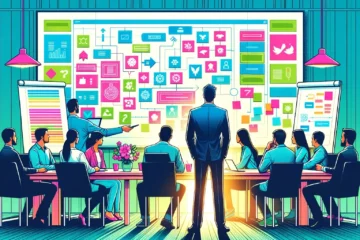- The article explores the concept of “technological tolerance” in a world rapidly embracing future technology.
- It delves into the reactions and perceptions towards individuals who opt for traditional tech choices, like push-button phones or cash transactions, in an era dominated by smartphones and digital payments.
- The narrative extends the principle of tolerance, traditionally associated with respecting diverse opinions and lifestyles, to include varying approaches to technology.
Have you ever been totally jazzed about the latest tech gadgets, only to encounter someone who seems to be stuck in a bygone tech era? Picture this: you meet someone who’s still clinging to their trusty old push-button phone amidst our sleek smartphone revolution. What’s your immediate thought?
Is this person an endearing oddball, slightly out of touch, or just a bold non-conformist? And what’s your reaction when someone suggests sending money through the post office the old-school way or—believe it or not—handing over cash instead of a quick card swipe? Or when you find out someone’s practically invisible online because they steer clear of social media? These scenarios might just prompt us to ponder our tech manners and the concept of “technological tolerance” in the light of future technology.
In our modern narrative, the call for tolerance resonates far and wide. We’re encouraged to celebrate humanity’s rich diversity and cherish each other’s viewpoints, idiosyncrasies, and, yes, even our choices in technology. But as we stride boldly into the future, it’s intriguing to consider how this timeless value of tolerance might evolve, particularly as our tech habits become more intertwined with our personal identities.
Let’s delve a bit deeper. When we talk about “tolerance,” what do we really mean? Ask a handful of people, and you’ll likely hear a chorus championing respect for different opinions and ways of life. But let’s adjust the focus slightly—could our grasp of tolerance broaden to include the diverse ways we engage with technology?
Take, for instance, an article from The Economist titled “The world is fixated on the past,” which probes into our collective penchant for dwelling on bygone days rather than forging ahead. It posits that holding onto the past offers a comforting anchor of identity and control. But what fuels this nostalgia?
The allure of the “golden age” is fascinating. It’s often linked to our youth—a time filled with aspirations and endless possibilities, a moment when the future seemed limitless. Fast forward a bit, and looking back reveals a tapestry of unmet dreams and hard-won lessons. It’s hardly surprising that many of us are drawn back to times when the horizon of the future shimmered with potential.
Surprise of human life expectancy
In the past, the limited life expectancy of humans meant that only a select few were able to experience the “golden age” of life, where one reflects on the past and reminisces about the “good old days.” However, with advancements in healthcare and improved quality of life for older individuals, we now have the luxury of time and opportunity to look back on our lives and make a comeback to days gone by. Moreover, this experience, which was once limited to a privileged few and passed on only through word of mouth, has now expanded its reach and is breaking into the digital realm.
In the digital epoch we inhabit, our capacity to reminisce and share has soared to unprecedented levels, thanks to social media and the broader internet. This digital loudspeaker empowers us to broadcast our nostalgia, sometimes casting the past in a light more radiant than reality.
Changes’ velocity
Yet, there’s another layer to this narrative. The velocity of today’s innovation is nothing short of breathtaking. Transitions from groundbreaking inventions to everyday staples, which once spanned decades, now unfold in mere moments. This whirlwind of change, while exhilarating, can also inspire a yearning in even the most tech-forward among us to occasionally savor the comfort of the familiar.
This is where the splendor of diversity shines through. In a truly liberated society, there’s space for everyone—the gadget aficionado eagerly anticipating the next innovation and the craftsman, content in their timeless art, undisturbed by the relentless march of progress.
As we venture towards a future brimming with automation and AI, it’s vital to keep in mind that not everyone is keen on a life ruled by devices and algorithms. The quandaries of the digital age extend beyond mere job competition; they touch on the essence of our identities, our liberties, and our sovereign right to navigate our relationship with technology.
Fair of loss
The reluctance to adopt new technology isn’t merely a longing for the past; it’s a profoundly human response grounded in fear of losing what’s familiar. It’s about balancing the known against the unknown and making choices that resonate with us.
Fear or even resistance to innovation is a natural human reaction. Calestous Juma, author of “Innovation and Its Enemies: Why People Resist Technology,” wrote in his book: “Fear of loss, not novelty, is at the heart of social movements against new technologies.” If a person doesn’t comprehend the underlying principles of a new technology, they may not be able to accurately assess its benefits. As a result, they may focus solely on the potential risks and losses, adhering to the ‘bird in the hand’ principle.
Curiously, research like the Pew Research Center study unveils a cautious stance toward technological advancements that promise to enhance our physical and cognitive abilities. It appears that for many, the value of autonomy and freedom trumps the allure of technologically augmented superhuman abilities.
So, as we chart our course through this brave new world, let’s not overlook the significance of technological tolerance. Can we, the devotees of tech, extend our empathy and respect to those who perceive the digital realm through a different lens? And crucially, can we ensure they have the freedom to choose their own trajectory, even if it veers away from the mainstream tech narrative?
These questions might not yield simple answers, but they’re undoubtedly worth exploring. As we navigate a future teeming with potential, it’s clear that none of us can confidently predict where we’ll land. It seems the journey towards understanding and tolerance is a collective one, traversed together, regardless of where we fall on the tech spectrum.

New Trends in Energy Trading and Risk Management Software












